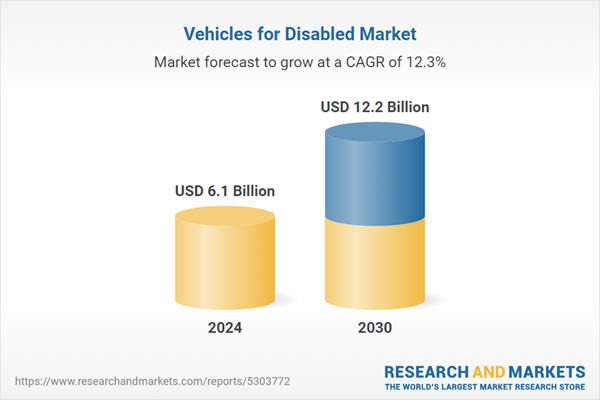Global Vehicles for Disabled Market - Key Trends & Drivers Summarized
What Are Vehicles for Disabled Individuals, and Why Are They So Crucial in Mobility Solutions?
Vehicles for Disabled Individuals are specially designed or modified vehicles that provide enhanced mobility, safety, and comfort for people with physical disabilities or mobility challenges. These vehicles feature various adaptations, including wheelchair ramps, lifts, hand controls, swivel seats, automatic doors, and lowered floors, making them accessible to users with diverse mobility needs. Available as personal vehicles, public transport, or commercial fleets, they ensure that people with disabilities have the same opportunities for independent transportation as others.The importance of vehicles for the disabled lies in their role in promoting independence, social inclusion, and better quality of life. By offering greater freedom of movement, these vehicles enable individuals to commute to work, access healthcare, participate in social activities, and manage daily tasks with dignity and ease. As awareness of accessibility rights grows globally, and regulations increasingly support equal transportation opportunities, vehicles for disabled users have become a vital part of the broader movement toward inclusive mobility solutions.
How Are Technological Advancements Shaping the Vehicles for Disabled Market?
Technological advancements have significantly improved the accessibility, safety, and functionality of Vehicles for Disabled Individuals, driving innovation across personal and public transportation options. One of the most significant developments is the introduction of advanced wheelchair lifts and ramps, which feature automated, lightweight, and faster mechanisms. Modern lifts offer smoother operation, allowing users to enter and exit vehicles with minimal effort. Additionally, foldable and retractable ramps, which are now common in accessible vans, provide easy storage and faster deployment, enhancing convenience and reducing the space needed inside the vehicle.Advancements in adaptive driving technologies have further transformed vehicles for disabled drivers. These technologies include hand controls for throttle and braking, electronic joysticks for steering, and voice-activated commands for vehicle operation. Digital interfaces and AI-powered assistance systems allow for personalized driving settings based on user preferences, making it easier for drivers with physical limitations to control vehicles independently. The development of 'drive-by-wire' systems, which replace traditional mechanical controls with electronic interfaces, offers enhanced customization and responsiveness, supporting drivers with various disabilities.
The rise of autonomous vehicle (AV) technology has opened new possibilities for disabled mobility. Self-driving vehicles equipped with AI-driven navigation, automated pickups, and drop-offs could provide seamless and fully independent transportation for people with disabilities. While widespread deployment of fully autonomous vehicles is still in development, semi-autonomous features such as lane-keeping assist, adaptive cruise control, and automated parking are increasingly available in accessible vehicles. These technologies enhance safety and comfort for disabled drivers and passengers, aligning with broader trends toward smarter and more inclusive transportation solutions.
What Are the Emerging Applications of Vehicles for Disabled Across Different Transportation Modes?
Vehicles for Disabled Individuals are finding expanding applications across various transportation modes, driven by the need for greater accessibility and mobility independence. In personal transportation, modified vans, SUVs, and cars equipped with ramps, lifts, and hand controls are popular among individuals seeking private mobility solutions. These personal vehicles offer customized adaptations, such as wheelchair restraints, swivel seats, and remote-controlled doors, enabling users to travel independently or with minimal assistance. Electric vehicles (EVs) designed for disabled users are also emerging, with lower floors, extended battery ranges, and easy entry features, aligning with the broader shift toward sustainable and accessible transportation.In public transportation, accessible buses, taxis, and ride-sharing services are increasingly equipped with features that accommodate disabled passengers. Low-floor buses with extendable ramps, priority seating areas, and audio-visual announcements make it easier for passengers with mobility challenges to board, alight, and navigate routes. Taxi and ride-sharing services have adapted vehicles with wheelchair access and automated ramps to provide on-demand transportation for disabled passengers, improving access to flexible mobility options. Autonomous shuttle services in smart cities are being tested for full accessibility, aiming to provide seamless, inclusive transportation for all users.
Commercial fleets, such as paratransit services, healthcare transport, and community shuttle programs, rely heavily on accessible vehicles to serve disabled passengers. These fleets are designed to transport users to medical appointments, rehabilitation centers, and community facilities, with features like stretchers, wheelchair restraints, and medical equipment storage. School buses and university shuttles are also being modified to accommodate disabled students, ensuring equal access to educational opportunities. The expanding applications of vehicles for disabled individuals across these transportation modes highlight their critical role in creating a more inclusive and accessible transportation ecosystem.
What Drives Growth in the Vehicles for Disabled Market?
The growth in the Vehicles for Disabled market is driven by several factors, including increasing awareness of disability rights, supportive government regulations, and advancements in accessibility technologies. One of the primary growth drivers is the global emphasis on equal mobility access for all individuals. As governments, non-governmental organizations (NGOs), and advocacy groups push for more inclusive transportation policies, the demand for vehicles that accommodate people with disabilities has surged. Regulations such as the Americans with Disabilities Act (ADA) in the U.S. and similar laws worldwide mandate accessible public transportation, driving investment in accessible vehicles.The rising aging population, which often experiences mobility challenges, has also contributed to market growth. As populations age, the need for transportation solutions that cater to physical limitations increases, driving demand for vehicles equipped with adaptive features like wheelchair lifts, ramps, and modified seating. Additionally, the growth of medical transportation services, including paratransit and non-emergency medical transport (NEMT), has fueled demand for specially adapted vehicles that provide safe and reliable transportation for disabled patients.
Technological innovations in adaptive controls, autonomous features, and IoT-enabled monitoring systems have further accelerated the adoption of vehicles for disabled users. Smart features like automated ramps, voice-activated controls, and real-time vehicle tracking enhance user convenience and safety, making these vehicles more attractive to both private users and public service providers. The emergence of electric and hybrid vehicles designed specifically for accessibility also aligns with global sustainability goals, creating additional growth opportunities. With ongoing advancements in vehicle adaptation technologies, digital integration, and regulatory support, the Vehicles for Disabled market is poised for strong growth, driven by global trends toward inclusive, safe, and sustainable mobility solutions.
Report Scope
The report analyzes the Vehicles for Disabled market, presented in terms of market value (US$ Thousand). The analysis covers the key segments and geographic regions outlined below.- Segments: End-Use (Mobility Scooters, Passenger Cars, SUV / MPV, Pick-Up Trucks).
- Geographic Regions/Countries:World; United States; Canada; Japan; China; Europe (France; Germany; Italy; United Kingdom; and Rest of Europe); Asia-Pacific; Rest of World.
Key Insights:
- Market Growth: Understand the significant growth trajectory of the Mobility Scooters segment, which is expected to reach US$5.9 Billion by 2030 with a CAGR of a 13.2%. The Passenger Cars segment is also set to grow at 12.3% CAGR over the analysis period.
- Regional Analysis: Gain insights into the U.S. market, valued at $1.7 Billion in 2024, and China, forecasted to grow at an impressive 11.7% CAGR to reach $1.9 Billion by 2030. Discover growth trends in other key regions, including Japan, Canada, Germany, and the Asia-Pacific.
Why You Should Buy This Report:
- Detailed Market Analysis: Access a thorough analysis of the Global Vehicles for Disabled Market, covering all major geographic regions and market segments.
- Competitive Insights: Get an overview of the competitive landscape, including the market presence of major players across different geographies.
- Future Trends and Drivers: Understand the key trends and drivers shaping the future of the Global Vehicles for Disabled Market.
- Actionable Insights: Benefit from actionable insights that can help you identify new revenue opportunities and make strategic business decisions.
Key Questions Answered:
- How is the Global Vehicles for Disabled Market expected to evolve by 2030?
- What are the main drivers and restraints affecting the market?
- Which market segments will grow the most over the forecast period?
- How will market shares for different regions and segments change by 2030?
- Who are the leading players in the market, and what are their prospects?
Report Features:
- Comprehensive Market Data: Independent analysis of annual sales and market forecasts in US$ Million from 2024 to 2030.
- In-Depth Regional Analysis: Detailed insights into key markets, including the U.S., China, Japan, Canada, Europe, Asia-Pacific, Latin America, Middle East, and Africa.
- Company Profiles: Coverage of players such as Advanced Mobility Products, Afikim Electric Vehicles, Allied Vehicles, AMF Bruns, Amigo Mobility International and more.
- Complimentary Updates: Receive free report updates for one year to keep you informed of the latest market developments.
Some of the 42 companies featured in this Vehicles for Disabled market report include:
- Advanced Mobility Products
- Afikim Electric Vehicles
- Allied Vehicles
- AMF Bruns
- Amigo Mobility International
- AMS Vans
- Braunability
- Brother Automobility
- Drive Devilbiss Healthcare
- Electric Mobility Euro
This edition integrates the latest global trade and economic shifts into comprehensive market analysis. Key updates include:
- Tariff and Trade Impact: Insights into global tariff negotiations across 180+ countries, with analysis of supply chain turbulence, sourcing disruptions, and geographic realignment. Special focus on 2025 as a pivotal year for trade tensions, including updated perspectives on the Trump-era tariffs.
- Adjusted Forecasts and Analytics: Revised global and regional market forecasts through 2030, incorporating tariff effects, economic uncertainty, and structural changes in globalization. Includes historical analysis from 2015 to 2023.
- Strategic Market Dynamics: Evaluation of revised market prospects, regional outlooks, and key economic indicators such as population and urbanization trends.
- Innovation & Technology Trends: Latest developments in product and process innovation, emerging technologies, and key industry drivers shaping the competitive landscape.
- Competitive Intelligence: Updated global market share estimates for 2025, competitive positioning of major players (Strong/Active/Niche/Trivial), and refined focus on leading global brands and core players.
- Expert Insight & Commentary: Strategic analysis from economists, trade experts, and domain specialists to contextualize market shifts and identify emerging opportunities.
Table of Contents
Companies Mentioned (Partial List)
A selection of companies mentioned in this report includes, but is not limited to:
- Advanced Mobility Products
- Afikim Electric Vehicles
- Allied Vehicles
- AMF Bruns
- Amigo Mobility International
- AMS Vans
- Braunability
- Brother Automobility
- Drive Devilbiss Healthcare
- Electric Mobility Euro
Table Information
| Report Attribute | Details |
|---|---|
| No. of Pages | 132 |
| Published | February 2026 |
| Forecast Period | 2024 - 2030 |
| Estimated Market Value ( USD | $ 6.1 Billion |
| Forecasted Market Value ( USD | $ 12.2 Billion |
| Compound Annual Growth Rate | 12.3% |
| Regions Covered | Global |









